Program to Train More Black Surgeons in Organ Donation, Transplants to Combat Racial Disparities
More than 60 percent of the over 100,000 patients waiting for an organ transplant are people of color.
By Jasmina Alston, Atlanta News First
ATLANTA, Ga. (Atlanta News First) - LifeLink of Georgia and Morehouse School of Medicine began a program to train more Black surgeons in both organ donation and transplants to combat racial disparities in the field.
John Lilley is the associate executive director at LifeLink of Georgia, where work is done with hospitals to identify potential organ donor patients and help facilitate the organ donation process.
“In the United States, there’s close to 104,000 people that are awaiting a lifesaving transplant,” Lilley said. “A majority of those, about 86 percent, are awaiting a kidney transplant.”
Of those 104,000 patients, Lilley added that over 60 percent of them are people of color.
When it comes to kidney transplants specifically, a change to a racially biased organ test has been happening. The eGFR test would overestimate a Black person’s kidney function, calculating Black and non-Black patients’ results differently, meaning a Black patient could be less likely to get a new kidney.
National kidney and organ transplant organizations called for a change several years ago to use race-free equations instead when it comes to kidney function.
Now the transplant network is giving hospitals a year to find out which Black kidney candidates could have received a new kidney sooner, if not for this test, as well as adjusting their wait time, per an A.P. report.
This is part of the reason why the partnership between LifeLink and Morehouse School of Medicine is important, to keep these disparities from happening, according to Lilley.
He told Atlanta News First less than 7 percent of nephrologists and less than 5 1/2 percent of transplant surgeons are Black.
“Increasing the amount of minority physicians in our community can only help us in spreading the importance of organ, eye and tissue donation,” Lilley said. “And saying that this is a good thing for our community.”


